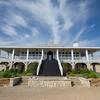WESTMINSTER — A flock of geese exploded suddenly out of a dormant farm field and into a frigid December sky, creating cacophony and a momentary sense of overhead chaos.
It’s a spectacle John Palmer has long enjoyed watching from the front porch of his house on Lowell Boulevard, from where he has an unimpeded view of a piece of ground that’s largely been frozen in time for more than a century.
“It can be very peaceful,” he said, motioning to three large flocks of the birds spread across the field. “People are just amazed that there’s something like this that’s still around in a city.”
But the 64-year-old Westminster native knows the geese, and the expansive field where they gather, are on borrowed time. Exactly one year ago this week, elected leaders in this city northwest of Denver approved the 2,350-home Uplands project, a mixed-use development whose centerpiece is the 150-acre farm — with breathtaking views of the mountains — at the corner of W. 84th Avenue and Federal Boulevard.
While developer Oread Capital & Development has yet to move a thimble of dirt since the Dec. 21, 2021, City Council vote in its favor, this summer may be when ground finally breaks on its project.
“Our engineering and infrastructure approvals are in progress, and several approvals for homebuilder partners are being processed through the city now,” said Chad Ellington, owner of Peak Development Group, which is partnering with Oread on Uplands.
But nothing is certain in a housing market knocked on its heels — single-family home sales are down 32.1% on the year in metro Denver and 34% statewide — as mortgage rates eclipsed 7%. Uplands promises to provide the “missing middle” category in housing — denser multifamily units that are more affordable for working-class residents.
“The housing market is definitely a challenge at the moment, but this is an A-plus location and demand remains very high for the smaller, more attainable housing that Uplands will deliver,” Ellington said.
Full build-out could take as long as 15 years, he said.
That’s a block of time that opponents of the project hope to delay and extend for as long as they can. Karen Ray, with the group Save the Farm, said she and other detractors will be vigilant as each of the five parcels that make up the development goes under city review.
In February, she attempted to overturn City Council’s approval of Uplands with a proposed referendum. It failed to gather enough signatures to make it to a ballot.
“We will be there to try and prevent any more degradation of the community,” Ray said. “The more red tape, the more delay — the better.”
The approval of Uplands a year ago was an epic undertaking in the annals of Westminster City Council. The final 5-2 yes vote, which came in the early morning hours of Dec. 21, followed three long nights of often contentious public input.
The hundreds of residents who spoke were largely against the project, with claims that Uplands is too dense and too tall for a neighborhood that is primarily made up of older single-family homes. There was no shortage of focus on preserving the farm at the center of it all, with its uninterrupted view of the setting sun that thousands of motorists driving on Federal Boulevard pass every day.
Palmer, whose modest house was built in the late 1950s during the post-World War II suburban housing boom, worries about the water the new project will require.
“We don’t have the water,” he said.
For the two council members who voted down the project last December, the concerns run the gamut from traffic impacts to lack of affordable housing.
“The dumping of thousands of extra cars onto an already overcapacity Federal (Boulevard) is very harmful and there is little the city can do to mitigate this enduring mess for our residents and future residents,” Councilman Bruce Baker said.
Baker also criticized the city’s approval in September of a Metropolitan Special District for Uplands, claiming it would shift $60 million of infrastructure development costs to future property owners. Councilman Obi Ezeadi said he would vote no again on Uplands.
“I voted no for several reasons, mainly the developer’s refusal to increase the number of affordable housing units,” he said. “The vast majority are at or above market rate, completely unaffordable for a working-class resident.”
Related Articles
-
Westminster approves Uplands project on century-old farmland following grueling deliberations
-
Battle over proposal to develop Westminster farmland comes to a head amid protests, opposition
-
Developer sets sights on huge swath of scenic metro Denver farmland
Ezeadi is also wary of the purchase of the entire 233 acres by Minneapolis-based hedge fund Varde Partners in February for $55 million from the Pillar of Fire church, which for years had leased the land out for agriculture.
Ellington said Uplands will finally open up the farm to public access, with parks and other gathering spots. And he cast the project as “a big part of the solution to the housing crisis plaguing the entire Front Range.”
“For the second year in a row, Westminster holds the top spot for most expensive rentals in the Denver metro area and home prices continue to grow year over year,” he said. “We’re eager to get shovels in the ground and get people into new housing, and we’ve spoken with dozens of working families, law enforcement, teachers, nurses, and others who are eager for more housing options.”
But Ray and others will continue to put pressure on Uplands, pushing for fewer housing units and more open space. She said she’s heard from three residents who plan to run for Westminster City Council next year based solely on their opposition to the project.
“I think there’s still a fight to be had,” she said.

